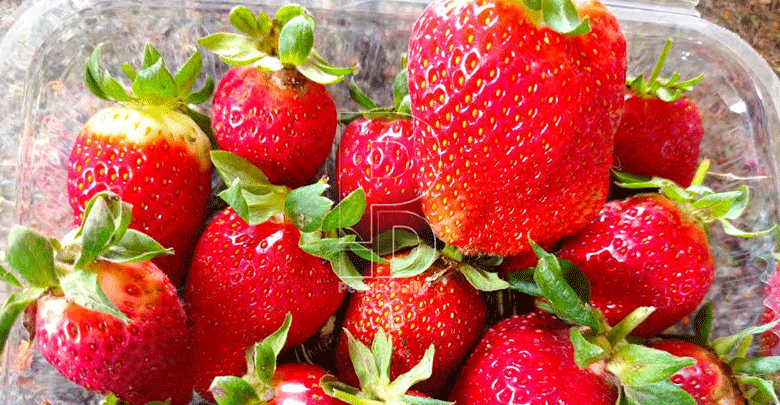Finding gold in chandler strawberry farming

Benson Nyingi is among the few farmers in the country reaping rich rewards from growing different types of berries, brussel sprouts, banana passions and tree tomatoes. And as he reveals, mature berries have a ready market and the demand is nowhere near being met.
Milliam Murigi @millymur1
When Benson Nyingi quit his job 17 years ago, all he wanted was to become his own boss.
Instead of applying for another job, he leased an eighth of an acre piece of land in Ndenderu, Kiambu county and started growing strawberries.
Then there were very few strawberry farmers in the country and the fruit demand was high.
Since he had gained enough knowledge on strawberry farming from his former employer, he experienced no challenges in this new venture.
“One of the companies that I had worked for before quitting was Flamingo Horticulture Limited, formerly known as Flamingo Homegrown, a vertically integrated horticultural business that deals with sustainably produced flowers, vegetables and herbs, where I was a grade three supervisor for the berries department.
I learned a lot on berries farming, but strawberry is what I liked most,” he recounts.
Since strawberry is a fast-growing fruit, the fruits were ready for picking before he knew it. 
At first, the farm was not doing so well and he had to look for side hustles to make ends meet.
Two years later, in 2006, his farm was doing so well that he went back to being a full-time farmer.
“My farm then would have accommodated 7,500 seedlings, but I could only afford 2,500 seedlings.
I used to harvest about 150 kilogrammes per week. This was way below the production capacity,” he says.
However, after visiting various successful strawberry farmers, production started to increase. From the proceeds, he expanded his farm and also diversified to types of berries and tree tomatoes.
Today, he has three acres of land under strawberries, an eighth of an acre under raspberries, another eighth of an acre under brussels sprouts, a quarter of an acre under golden gooseberries, another quarter of an acre under banana passion, one acre under tree tomatoes, and one and a half acre is used for water harvesting.
With strawberry being his main fruit, he says that he has plans to expand the strawberry acreage to eight acres and raspberry to two acres since the demand for the two fruits is high.
Currently, he harvests about 280 punnets of strawberry every day and the fruits have a ready market.
He also buys fruits from the farmers he trains. “My main market for all my produce is in Mombasa.
My strawberries go for between Sh100 and Sh160 depending on the customer and the quantity.
On why I want more acreage under strawberry is because they are ever bearing,” he explains.
Nyingi plants chandler strawberry variety because they are high–yielding, they are large and firm, and they have an exceptional flavour.
Once harvested, they can go for up to five days before going bad. They are also good for eating fresh, shipping, and freezing. However, they are not the best for processing.
Today, Nyingi is one of the most sought after strawberry farmers in Kenya. He reveals that this is because his strawberries are always sweet and heavy, weighing up to 42 grammes.
He also trains people on strawberry farming at a fee. His secret to heavy fruits he says, is plenty of water.
According to him, for every strawberry farmer to succeed they need to feed the plants enough water. “Strawberries require a lot of water and manure, since it is a heavy feeder fruit.
The more the water, the heavier and sweeter the fruit as 90 per cent of strawberry fruit is made up of water,” he offers, adding,
As for the best fertiliser for the fruit, compost manure is recommended.”
And what are the common mistakes most strawberry farmers make unknowingly?
Nyingi says that a good number of farmers cover the plant bud with soil when planting, which kills the whole plant.
Also, farmers are not testing their soils before venturing into this kind of farming something, which must be done not only for strawberries, but also for other plants.
Apart from that, once the farmer starts harvesting (after 75 days) a good number goes for all ripe fruits.
This is wrong since one is supposed to pick only one fruit per stem to ensure productivity is preserved.
The biggest mistake that most farmers make is the use of untreated manure. It is always recommended to treat your manure before using it because manure carries fungal infections and cat worms.
“When making composite manure, ensure that it is well done. Always go for plants that have flowers and not the vegetative ones to make the manure. For watering, drip irrigation is preferred than sprinklers,” he offers.
His advice to farmers who would like to venture into strawberry farming is that before buying the seedlings, always visit the source of the seedlings.
If possible, always avoid potted seedlings and go for naked ones. This is because, the survival rate of the potted seedlings after transplant is very low. Naked seedlings usually have a 14-day dormancy period after which they start growing again.



